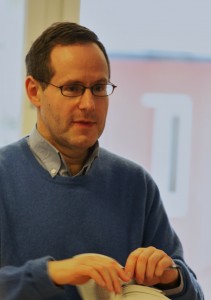
On January 18, Dr. Simon May visited ECLA to lecture students on Christian love in reference the gospel of Matthew. Dr. May is Fellow in Philosophy at Birkbeck College, University of London. Dr. May’s lecture focused on two related questions: firstly, how did Christianity develop the idea of love as the supreme value? Secondly, is Christian love really universal or unconditional?
The guest lecturer started by pointing out that Christianity embraces many manifestations, but there is one idea that applies to all; “That love is a godlike power”, he said, “since with it we can rise above the human”. This, in turn, can also be a sacrilege, since with love humans have the power to become like gods. However controversial this is, love can be seen as the core Christian value against which all other values have to be measured.
Simon May then moved on to explain how the idea of Christian love that we have today has more to do with later interpretation of the Gospels than what Jesus himself said. “Jesus hardly talks about love. Nor is it clear that love as he describes it is unconditional”, Dr. May said.
The guest stated that Christ in no way sees love as something that goes beyond everything, and that he spoke of love in a far more modest way than was later claimed in his name. How exactly, nonetheless, is love the supreme value in Christianity? “Since love is the way in which God reveals his nature, it becomes the highest good. It is the measure of all values”, Dr. May explained. Without an all-powerful God to reconcile the humble and the godlike aspects of love, those values could have developed in different directions, either positive or negative.
In the New Testament there are two ideas of God’s universal love. One of them is marriage: God’s love, though the medium of marriage, is granted only to those who deserve it; many are called but few are chosen. The other idea is of the grace of being chosen. Dr. May then stated that Christianity has transcended reward-based morality with a religion of universal love, even though rewards continue to play a role. However, “It’s not clearly universal. What does it mean that love is unconditional? It has to do with God’s forgiveness, which is far from unconditional”, he explained.
An unconditional love would mean – as Protestants believe – that God loves everyone, regardless of the sins they have committed. However, in Catholic Christianity, God forgives only those who truly repent , not those who sin while relying on their faith in God for salvation. At the same time, God is indeed omnipotent and available, hence divine love also is. All human love is, on the other hand, conditional and transient. Dr. May then brought his lecture to an end: “Love has been raised as an unconditional ideal in order to sustain the idea of an undefeatable God in an era that seeks to destroy anything divine”.
by María Cruz (AY ’10, Argentina)
